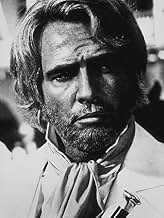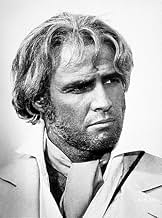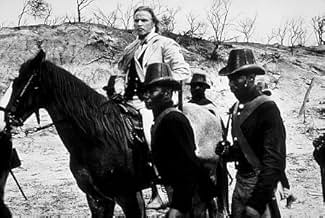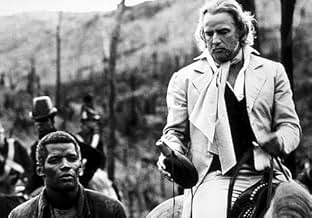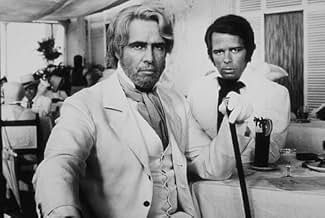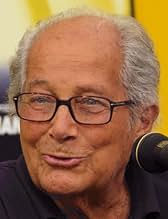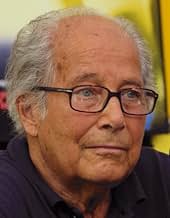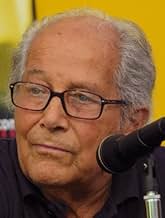Un mercenario profesional instiga una revuelta de esclavos en la isla caribeña de Queimada para mejorar el comercio de azúcar para los británicos, solo para más tarde ser enviado a acallarla... Leer todoUn mercenario profesional instiga una revuelta de esclavos en la isla caribeña de Queimada para mejorar el comercio de azúcar para los británicos, solo para más tarde ser enviado a acallarla.Un mercenario profesional instiga una revuelta de esclavos en la isla caribeña de Queimada para mejorar el comercio de azúcar para los británicos, solo para más tarde ser enviado a acallarla.
- Dirección
- Guionistas
- Elenco
- Premios
- 5 premios ganados y 1 nominación en total
- José Dolores
- (as Evaristo Marquez)
- Juanito
- (as Joseph P. Persaud)
- Soldier
- (as Alvaro Medrano)
- Engl. Major
- (as Alejandro Obregon)
- Lady Bella
- (sin créditos)
- Man on the ship
- (sin créditos)
- Ramón
- (sin créditos)
Opiniones destacadas
Walker is sent to the island of Queimada on two occasions in furtherance of British interests in the sugar trade. Initially he is employed by the Admiralty to incite a rebellion against the Portugese and install an independent government. Ten years later he returns, this time on behalf of a major sugar company, to destroy the rebel leader he himself has created.
Walker, however, is an ambivalent figure, only too aware of the contradictions in his nature. His stance is that of the professional who tries 'to do a job well, and to see it through'. At the same time, he admires Jose Dolores, the rebel leader, and is contemptuous of those not fighting alongside him. ('Why aren't you up there with them on the Sierra Madre?' he asks a bemused government soldier.) When his successful counter-insurrection leads to Jose Dolores' capture, Walker offers him the chance to escape execution, and is then puzzled by his refusal. As a man without political conviction, Walker cannot comprehend it in others.
The film is not without its flaws. Some fairly ruthless cutting leaves the plot difficult to follow on first viewing. The middle section, accounting for the intervening years in Walker's life, is unconvincing. If he is a disillusioned man, reduced to drinking and brawling (through self-loathing?) there is no sign of it on his return to Queimada. And whatever happened to his next assignment in, ironically, Indo-China?
The rest of the multi-national cast are no match for Brando, who has most of the dialogue and is seldom off screen. Jose Dolores, for example, is played by a young Colombian who had never seen a film before, let alone acted in one, and the imbalance between the two performances is all too evident. Pontecorvo orchestrates the big crowd scenes well, and they have the documentary feel of Battle of Algiers, but they cause the film to swing unevenly between action and ideas.
Making the film was apparently an unhappy experience for all concerned. Shot mainly in Colombia, working conditions were appalling with the cast and crew subject to illness, bad weather and threats of violence. With Italian, French, English and Spanish speakers involved, there were major problems of communication. Brando and Pontecorvo had different views on the main character - the director wanted him portrayed as an unmitigated force of evil while Brando pushed for more light and shade - and relationships between the two deteriorated rapidly. Filming was finally completed in Morocco after Brando, who was at a very low ebb in his life, walked off the set and threatened to quit the production altogether.
Despite its flaws, it remains a fascinating film, with a literate script, a strong anti-racist message and a central performance of great intelligence and wit. Why has it never been released on video in the UK?
Small wonder this film disappeared quickly from American screens. It's a no-punches-pulled, heady stuff even for the rebellious 1960's. Brando was always an anti-imperialist, and I suspect this film amounted to the one he long hoped to make, despite many years of bad choices. The movie itself remains an insight into the ugly realities behind the dressed-up facade of history books, proxy armies, and cosmetic governments. And although, not Brando's best performance (dialects never brought out his best), the screenplay stands as a testament to a political conviction which, despite the early years of McCarthy red-baiting, never wavered and even smouldered to artistic heights during that same period. ( Disregard Leonard Maltin's characterization of the film as "muddled"-- his staff apparently failed to follow the twists and turns of the power struggle, which, despite Maltin's myopia, pursues a reasoned course on all sides.) Then too, catch up with the uncut European version if you can.
It is impressive the timing of director Gillo Pontecorvo to make and release "Burn!". In 1969, the South America was under military dictatorships promoted by the United States of America to improve their economical and political interests in the region. There are many parallel situations in the colonization process between what was happening in South America in that historical moment and in the fictitious island of Queimada in the previous century. Marlon Brando performs one of the most Machiavellians characters of the cinema history and very similar to the American advisors that supported the foregoing dictatorships (despite not using torture). His character is fascinating as well as his political capability to envision the consequences of his actions; he is indeed the personification of the thoughts and concepts of Machiavelli in "The Prince". My only remark is the use of English language in a Portuguese colony; Mr. Pontecorvo should have casted actors that speak Portuguese to be more accurate. My vote is eight.
Title (Brazil): "Queimada!" ("Burn!")
¿Sabías que…?
- TriviaMarlon Brando once said this film contains "the best acting I've ever done."
- ErroresPortugal never had any colonies in the Caribbean. Its only American colony, Brazil, has no coast in the Caribbean.
- Citas
Sir William Walker: Gentlemen, let me ask you a question. Now, my metaphor may seem a trifle impertinent, but I think it's very much to the point. Which do you prefer - or should I say, which do you find more convenient - a wife, or one of these mulatto girls? No, no, please don't misunderstand: I am talking strictly in terms of economics. What is the cost of the product? What is the product yield? The product, in this case, being love - uh, purely physical love, since sentiments obviously play no part in economics.
[general laughter]
Sir William Walker: Quite. Now, a wife must be provided with a home, with food, with dresses, with medical attention, etc, etc. You're obliged to keep her a whole lifetime even when she's grown old and perhaps a trifle unproductive. And then, of course, if you have the bad luck to survive her, you have to pay for the funeral!
[general laughter]
Sir William Walker: It's true, isn't it? Gentlemen, I know it's amusing, but those are the facts, aren't they? Now with a prostitute, on the other hand, it's quite a different matter, isn't it? You see, there's no need to lodge her or feed her, certainly no need to dress her or to bury her, thank God. She's yours only when you need her, you pay her only for that service, and you pay her by the hour! Which, gentlemen, is more important - and more convenient: a slave or a paid worker?
- Versiones alternativasThe complete version of this film runs 132 minutes. A 112-minute version under the title "Burn!" was released in the USA and the UK.
- ConexionesFeatured in Pontecorvo: The Dictatorship of Truth (1992)
Selecciones populares
- How long is Burn!?Con tecnología de Alexa
Detalles
Taquilla
- Total en EE. UU. y Canadá
- USD 431,817
- Tiempo de ejecución2 horas 12 minutos
- Color
- Relación de aspecto
- 1.66 : 1
Contribuir a esta página



